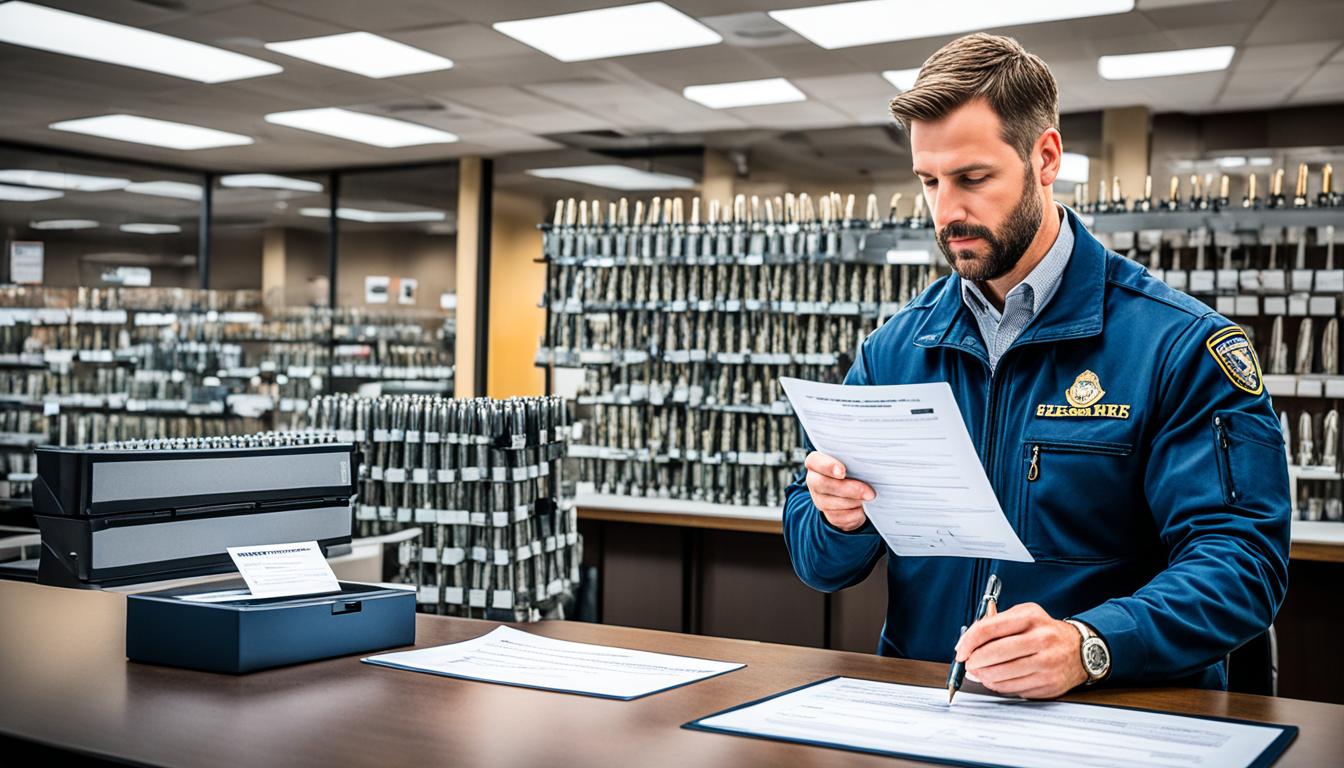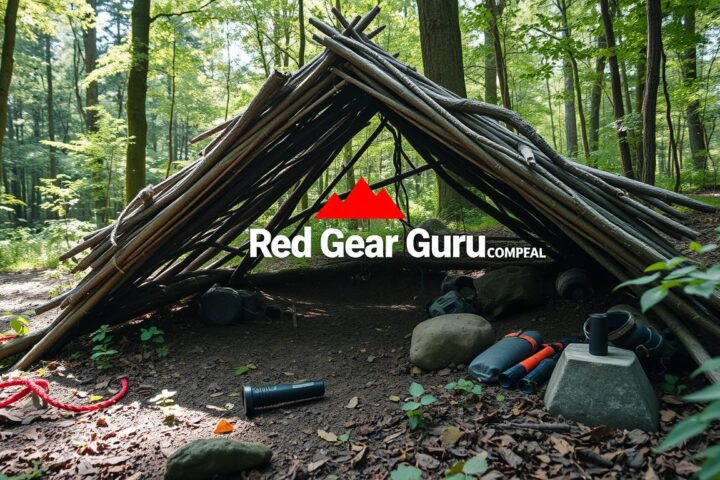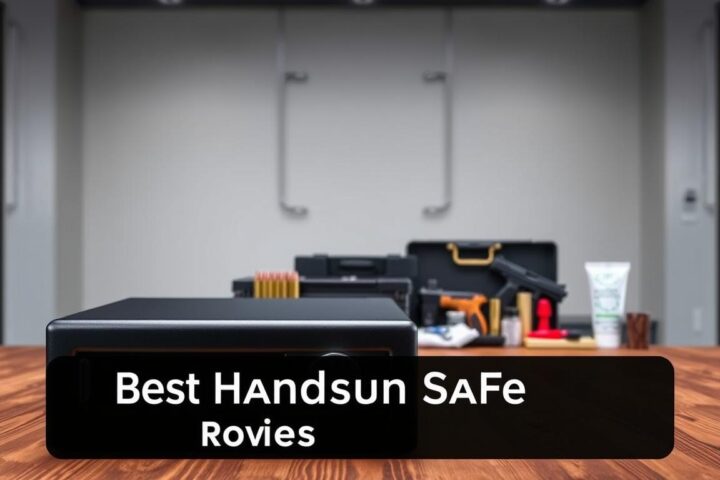In 2023, police handled over 450,000 calls about possible gun issues in schools across the U.S. This shows how vital it is to follow the law when selling ammo. The rules for selling ammo are complex, mixing federal and state laws. I’ll guide you through the steps to get a license, making sure you know the laws and keep everyone safe.
Key Takeaways
- Understanding the legal framework is essential to ensure compliance when selling ammunition.
- Different types of licenses may be required depending on your business model.
- The application process involves multiple steps and specific documentation.
- Dealing with regulatory agencies can be complex; knowing common pitfalls is a must.
- Financing options are available for those looking to start an ammunition business.
- Effective marketing strategies are crucial for standing out in the ammunition industry.
- Staying informed about changes in gun laws can prevent legal issues down the line.
Understanding the Legal Framework for Selling Ammunition
The laws for selling ammo are complex, with rules from both the federal and state levels. The main law is the Gun Control Act of 1968, which covers the sale of firearms and ammo across states. It’s crucial for my business to follow these laws to avoid legal trouble.
Every state has its own bullets regulations that matter to my business. Local laws might add more rules or needs. Knowing these rules helps me work with customers and suppliers in the American handgun culture.
Working with legal experts in firearm law is a big help. They can explain the laws and keep me updated on changes that might affect my business. Starting early with the right steps is key to doing well in this field.
There are resources for learning about bullets regulations specific to each state. Following these laws protects my business and helps improve the image of the industry.
Types of Licenses Required for Selling Ammunition
Starting an ammunition sales business means knowing about the ammunition seller licenses you need. The main license is the Federal Firearms License (FFL). This license is for those wanting to sell ammo. Without it, I can’t sell any ammo or bullets.
I also need to look into firearms industry licenses from my state. Each state has its own rules. Some might need a special state license for selling ammo. It’s key to check state laws along with federal ones. Local business permits might also be needed, based on where I operate.
Knowing about bullets licensing requirements shows me the steps and costs to start selling ammo. Getting licensed makes sure I follow the law and builds trust with customers. This is crucial for a successful business.
For a smoother application process, it helps to use resources like a guide on gun rights. This info helps me understand my specific licensing needs. It gives me a full view of what I need to do.
Steps to Apply for an Ammunition License
My journey to sell ammunition starts with understanding the steps to apply for a license. First, I need to figure out the right type of license. Each type has its own rules for selling ammunition. After picking the right license, I fill out forms with my personal and business info.
Then, I send these forms to the Bureau of Alcohol, Tobacco, Firearms and Explosives (ATF). I also pay any fees that are due. Knowing the right format for the application helps avoid delays.
After sending in my application, a background check is done. This check can take a while, depending on several things. So, I prepare for a wait before I can start selling ammunition legally.
Being organized helps me meet all the legal requirements smoothly. Each step not only follows the law but also deepens my understanding of selling ammunition legally.
Looking into quality products to sell is important once I get my license. I find it helpful to check out detailed specs, like those from Radical Firearms. They’ve been a trusted brand since 2013.
Documentation Needed for the Application Process
Applying for an ammunition license means getting ready with the right ammunition license documentation. I need to gather several important documents for a smooth application. These include:
- Proof of age, confirming I am at least 21 years old.
- A completed ATF Form 7, which serves as the essential federal application.
- Recent photographs and fingerprints, as required by the application standards.
- Any previously held licenses or permits, showing my experience in this field.
Some states also ask for more documents as part of their bullets business paperwork. For example, you might need zoning permits to follow local laws. It’s important to know these rules well since missing required forms for ammunition sales can cause delays.
To make things easier, I can look for resources that explain these requirements better. For example, managing the needed documents can really speed up the process.
Dealing with Regulatory Agencies and Bureaucracy
Working with regulatory agencies for ammunition is key in the bullets business. The main agency is the Bureau of Alcohol, Tobacco, Firearms, and Explosives (ATF). State agencies may also be involved, depending on local laws. Understanding the steps needed can help avoid problems and improve communication.
Key Regulatory Agencies Involved
The ATF manages most federal rules on selling ammunition. State agencies enforce laws that might impact my business. It’s important to know the rules from both levels to stay compliant. Meeting the standards set by these agencies is crucial to avoid fines or other penalties.
Common Pitfalls to Avoid During the Process
Applying to sell ammunition can be tricky. Some common mistakes include:
- Submitting incomplete applications, which can delay the approval process.
- Failing to promptly respond to requests for additional information, leading to potential denials.
- Not maintaining thorough records of correspondence with regulatory agencies for ammunition, which is vital for transparency.
Being organized and proactive can help avoid issues during the application phase. Getting help, like firearm training, can also improve my grasp of compliance rules. This ensures my business follows the law well.
Financing Your Ammunition Business
Getting ammunition business financing can be tough because of strict rules in the firearms industry. Banks often don’t want to lend to firearms businesses, making it hard to find money. I’ve found a few ways to get funding for my ammo-selling business.
- Personal savings are a common first step.
- Some banks offer loans for firearms businesses.
- Private investors might be interested in funding bullets sellers.
- Crowdfunding platforms now help with niche markets like firearms.
Creating a strong business plan is key to getting financing options for firearms businesses. It should show my business plan, expected earnings, and how I follow the law. This makes it easier to draw in investors and lenders.
Looking at alternative financing can also be helpful. Options like revenue-based financing might let me fund my business without bank loans. For more on rules and selling guns online, check out important guidelines.
Ammunition, Bullets, Ammo, Ammo & Bullets, Ammunition Review: A Business Perspective
Understanding the ammo and bullets market is key for success in selling ammunition. I keep an eye on what customers like and what calibers are popular. I also watch for new manufacturers to stay ahead.
Writing detailed reviews of ammunition gives me insights into its quality. This is crucial for my reputation. Offering good advice to customers builds trust and loyalty, which are vital for a strong business. With the right ammo review insights, I can stock my inventory to match what customers want.
Having a smart view on ammunition sales helps me adjust to market changes. I always check out what people say about different products and look for new and innovative ones. Knowing what customers want lets me stock my shelves with what both new and experienced shooters need.
Marketing Strategies for Your Ammunition Business
For my ammunition business, I use a mix of online and community efforts. I start by building a strong online presence with targeted ads. These ads reach people who are looking for ammunition. Social media lets me talk directly to enthusiasts and boost my bullets business.
- Using SEO makes my website more visible, helping customers find me easier.
- Working with local shooting ranges helps me make partnerships for promotions.
- Going to gun shows is key for networking with others in the industry and showing off my products.
Each ammunition marketing strategy needs ongoing work and flexibility. By checking which tactics work best, I can improve my marketing for firearms sales. This mix helps me get noticed by more people and grow my customer base.
Best Practices to Ensure Compliance and Avoid Legal Issues
In the ammunition business, it’s key to follow the law to avoid legal trouble. You need to know and stick to federal and state laws. Following best practices for ammunition compliance can help reduce risks and keep your business legal.
Monitoring Changes in Gun Laws
Keeping up with changes in gun laws is a must for those in the ammunition industry. Laws can change a lot, even within states. To stay on top of things, I suggest these steps:
- Subscribe to updates from reputable firearms law organizations.
- Engage with legal experts specializing in firearms regulations.
- Participate in industry forums to share information and insights.
- Regularly review government publications regarding ammunition laws.
Staying Updated on Local Regulations
It’s crucial to know the local laws for selling and storing ammunition. These laws often reflect community safety and standards. Here’s what I do to stay compliant:
- Establish connections with local law enforcement or regulatory bodies.
- Attend community meetings addressing firearm and ammunition regulations.
- Utilize local trade associations as resources for law updates.
- Regularly audit your business practices to align with local laws.
By keeping an eye on the law and making timely changes, I can keep my business running smoothly. It’s vital to understand compliance to succeed and stay in business in this field.
Conclusion
Thinking about getting a license to sell ammunition shows how important it is to know the laws well. This guide covers the key steps, like understanding government rules on bullets, filling out the right forms, and following the rules. Each step is vital for a successful ammo business.
At first, the process might seem overwhelming. But, by staying organized and up-to-date, I can handle the details well. To sell ammo, I need the right licenses and to keep up with new laws and market changes. This keeps me legal.
Even with challenges, the chance to succeed in selling ammo is big. I’m ready to follow responsible practices. This means my business meets industry standards and focuses on safety and following the law.
FAQ
What is the first step in obtaining a license to sell ammunition?
First, figure out what kind of license you need. This usually means getting a Federal Firearms License (FFL) for selling ammo and any state licenses needed.
What federal regulations govern the sale of ammunition?
The Gun Control Act of 1968 is the main federal rule for selling ammo. You must follow this law and your state’s rules to stay legal.
What documentation is required for an ammunition license application?
You’ll need to show your ID, fill out ATF Form 7, provide photos, and give fingerprints. Some places also want zoning permits.
How long does the application process for an ammunition license take?
It can take a while to get your license, depending on your application and the ATF’s speed. Be ready for a long wait.
How can I secure funding for my ammunition-selling business?
Look into personal savings, bank loans for firearms businesses, or private investors. A solid business plan can help you get funding.
What marketing strategies should I employ for my ammunition business?
Use online and social media, connect with local shooting ranges, and go to gun shows. A strong online ad campaign can grow your customer base.
How can I stay compliant with changing regulations in the ammunition industry?
Keep an eye on federal and state gun laws and local rules. Use legal resources and groups focused on firearms to help you stay on track.
What are some common pitfalls to avoid when applying for an ammunition license?
Don’t send in incomplete apps, ignore agency requests, or keep bad records. Knowing these mistakes can make applying easier.











